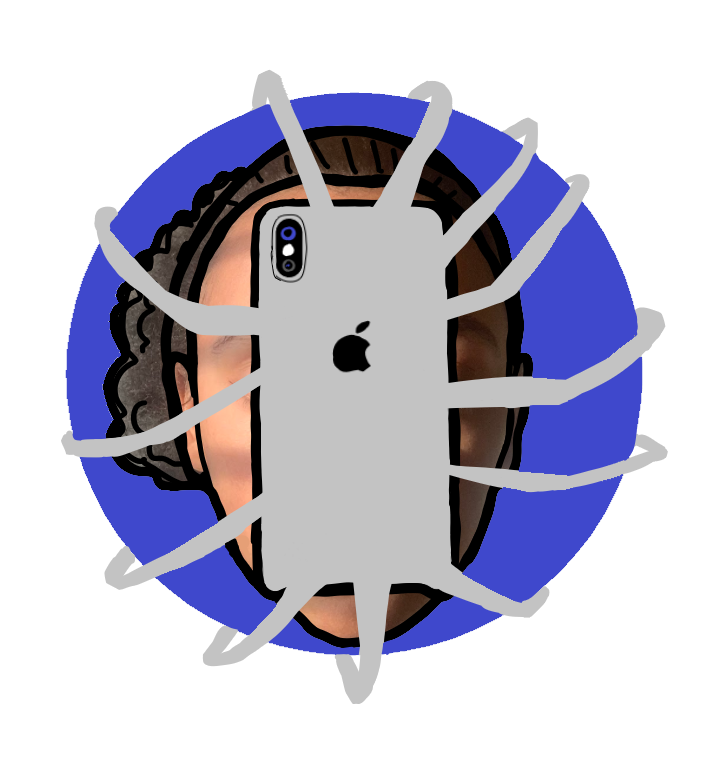Smartphones provide connection and comfort… until they don’t
Photo by Ava Bartels
Smartphones and social media are designed to keep a hold of a person’s attention, by making user feel that they cannot pull away from their phones.
Over the last decade, phone usage has skyrocketed around the world with the invention of the mobile phone. As phones have become more and more ingrained into people’s lives, many people have never looked into the negative side effects. While phones can seem harmless, a measly 26 minutes a day of checking messages will amount to a full 22 days a year of just messages. A study conducted by Psychology Today found that the average British adult will unknowingly waste upwards of 50 days staring at their screens. The simple answer is to cut themselves off from the source. If they commit to “stop using their phones as much,” they will, right?
Social media is widely credited for the overwhelming addiction to smartphones. From the chronic habit of refreshing the content, to the stimulating red notification bubble, social media is definitely designed to keep the users hooked. The primary design of social media platforms is to provide the user with as much dopamine in the brain as possible. After the brain has been significantly stimulated, it remembers that the source of it’s “happiness” came from refreshing the social media feed numerous times. The reason that no one seems to be able to break their phone addiction is rooted in the ingrained behavior that gives the brain this hefty shot of dopamine. While this can seem scary, one has to wonder if this is even an actual problem. To explain, yes social media is addicting, but it’s also entertaining and connects people from around the world. How could it be unhealthy?
Significant research finds that smartphones and worsened sleep quality go hand in hand. The problem with this is, that this overshadows the most alarming facts that everyone turns a blind eye to.
The usage of social media varies between people, but one of the main factors deals with comfort. A 2012 survey named “Sweden’s largest Facebook Study” found that Facebook has a direct correlation with lower self-esteem and distorts the user’s sense of reality. In addition to this, studies have found that all types of people have a deep-seated habit of running to social media platforms for comfort. And, once they are done using social media, people generally end up feeling worse. Envy is so unrestricted in the brain due to these platforms, that it can take any happy moment, and turn it into a comparison. The number one most ignored side effect is the low self-esteem social media continuously causes time and time again. Many social media users are unaware that they were only given a bit of faux happiness when they first downloaded social apps. People eventually gain a resistance to the large amount of dopamine released in their brains. Therefore, only extremely large amounts of dopamine will keep the addicted social media user entertained, negatively affecting every other area of their life.
For many people, their phones seem like an essential part of their daily lives. And in some ways, this is true. But the average person unlocks their phone 150 times a day, sleeps next to their phone, and 75% of Americans admitted to using their phone in the bathroom. How did phones become so necessary that people depend on them while on the toilet? When a behavior (such as using a smartphone) reaches the point of dependency, it becomes an addiction. The American Society of Medicine clearly conveys what an addiction is, “…impairment in behavioral control, craving, inability to consistently abstain, and diminished recognition of significant problems with one’s behaviors and interpersonal relationships…” Excessive phone use has also been linked to higher rates of suicide and depression. People tend to think of the amount of likes and hearts they get signify actual human connection. Sadly, in reality social media leaves everyone in a phone-dependent state, enforcing an insatiable craving of likes, a comparison mindset, and an overall worse quality of life.
Sources:
Is Social Media Bad for You? | Psychology Today
Smartphone Addiction, Revisited | Psychology Today
Teens and Dangerous Levels of Cell Phone Use | Psychology Today Canada
What Is an Addiction? Addiction Definition | HealthyPlace

Hi, my name’s Ava Bartels, I’m a senior, and this is my second year on The Oracle. In my free time, I enjoy drawing and sketching people, biking, and...



